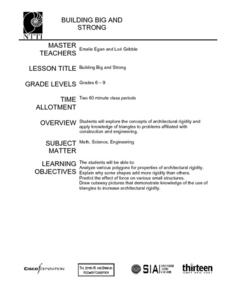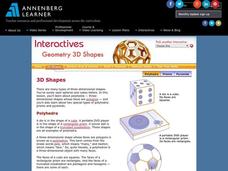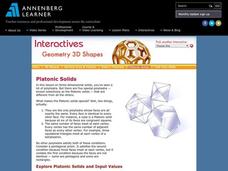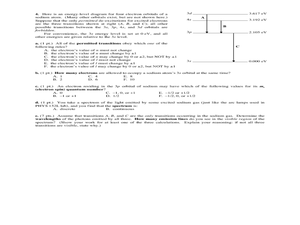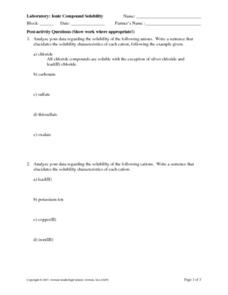Curated OER
Chapter 14 Review, Section 1: Acids and Bases
An overview of acid and base compounds and their reactions is presented with this handout. Pupils name compounds and write chemical formulas. They write net ionic equations and explain how acidic solutions might conduct electricity. This...
Curated OER
How many edges do I need to cut in order to open a cube?
Young scholars problem solve to open a cube to create different shapes. In this problem solving lesson plan, students are given a cube and the shapes to open it up to, and they have to cut the cube open to make certain shapes. This gives...
Curated OER
Net of a figure
In this 3D figure instructional activity, students observe the net of a 3D figure where you open up the figure and tell if it is an accurate representation of that figure. Students complete this for 3 figures.
Curated OER
Two for One Box Company: Student Worksheet
Fifth and sixth graders work alone or in pairs to determine the volume of paper boxes of various dimensions. Pupils write ratios of dimensions and volumes.
Curated OER
Building Big and Strong
Middle and high schoolers explore the concepts of architectural rigidity. They analyze a variety of polygons, and explain why some shapes add more strength to structures than others. The PBS video, "Building Big," is utilized in this plan.
Annenberg Foundation
Geometry 3D Shapes: 3D Shapes
Explore vocabulary related to three-dimensional shapes. An instructional website describes the characteristics of different geometric solids. Learners can use an interactive component to view nets, faces, vertices, and edges of common...
Annenberg Foundation
Geometry 3D Shapes: Platonic Solids
From polyhedrons to platonic solids, here is a lesson that will have your classes talking! As an introduction to platonic solids, scholars cut and fold nets to create the three-dimensional solids. They use an interactive component to...
Annenberg Foundation
Geometry 3D Shapes: Euler's Theorem
How do you get a theorem named after you? Euler knows what it takes! The third lesson of five asks pupils to use an interactive activity to compare the faces, vertices, and edges of seven different three-dimensional solids. They use...
Curated OER
Sliding Mass Problems
Physics masters solve five sliding mass problems. For each, there are a few different values to be determined: normal force, force of friction, acceleration, velocity, coefficient of friction, or net force. Pupils must draw a force...
Curated OER
Pyramids and Prisms: Guler's Formula
Sixth graders detect and categorize the attributes of geometric shapes to solve problems. In this geometry lesson, 6th graders construct a variety of polyhedra. Students recognize the relationships between two dimensional and three...
Utah Education Network (UEN)
Geometry
Shape one's understanding of geometry using the resource. The sixth of seven chapters in 6th Grade Math focuses on geometry principles. Future mathematicians learn to find the area of parallelograms, trapezoids, triangles, and other...
Curated OER
Physics 152 Fall 2004 Final Exam, Parts A, B, C, D
At the end of a general physics course focused on light and electricity, you can administer this exam. Concepts covered include electromagnetism, circuits, induction, light rays, lenses and mirrors, characteristics of light, electron...
Curated OER
Egg Carton Lobsters
Who doesn't love learning about the ocean? And who wouldn't want to help create an ocean themed mural? Little learners make lobsters out of recycled egg cartons, pipe cleaners, and paint. These are then used as part of a larger 3-D ocean...
Curated OER
The Two-Party System in American History: Ch 5
Five matching and 5 multiple choice questions to challenge your class. Their answers will test their knowledge of early American government. Party systems, Electorate, and major constituents of the time are the topics included.
Integrated Physics and Chemistry
Law of Conservation of Matter
Does mass change during a chemical reaction? Demonstrate the Law of Conservation of Matter while encouraging class members to be creative with a two-part lesson. First, learners use Alka-Seltzer® tablets and water to demonstrate the...
Curated OER
Use Nets to Build Solid Figures
In this using nets to build solid figures practice learning exercise, students sharpen their problem solving skills as they solve 6 story problems.
Curated OER
Laboratory: Ionic Compound Solubility
For this solubility worksheet, students answer post activity questions about the lab work they completed with ionic compounds. They write sentences about solubility of cations from their lab work. They write chemical reactions for their...
Curated OER
Analyzing 3-D Shapes and 2-D Representations
Students can analyze 3-D objects better with actual physical models and by also drawing 2-D representations of them.
Curated OER
Edible Geometry
Students examine a chart that lists the main characteristics of polygons and 3 dimensional figures. They make examples of the polygons and figures using pretzels and gum drops showing how the gum drops are vertices and the pretzels are...
Curated OER
MAKING THREE DIMENSIONAL PLANT AND ANIMAL CELLS
Young scholars create two different cells, one plant and one animal. In this plant and animal cell instructional activity students form groups and construct a part of a cell. Young scholars then put them all together to form one...
Curated OER
Connecting Formulas Related to Geometric Figures
Students identify diagrams of quadrilaterals and circles by different names and classify the figures. They name the areas for each diagram and practice solving the formulas for each.
Curated OER
Perimeter All Around
Young scholars explore perimeter and area of regular and irregular polygons. They experiment with color squares and create different arrangements using the same number squares. Then they compare the area and perimeter measurements of each.
Curated OER
Typical Numeric Questions for Physics I - Forces
Let's get moving! Newton juniors solve 19 problems using force, speed, and acceleration equations. This is a nifty worksheet that includes a few diagrams and multiple choice selections for each question. It provides the straightforward...
Science Geek
VSEPR and Molecular Geometry
Many chemistry jokes have no reaction. Presentation begins by explaining what models are and the limitations of various forms before introducing the VSEPR model. Then it outlines the rules for creating a VSEPR model and shows examples of...




